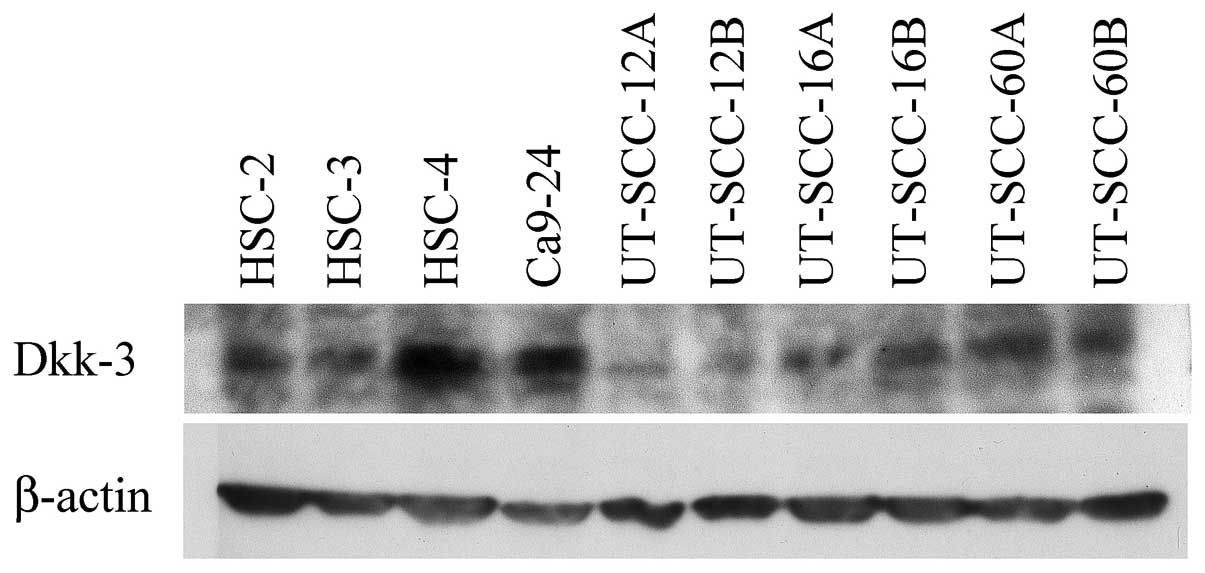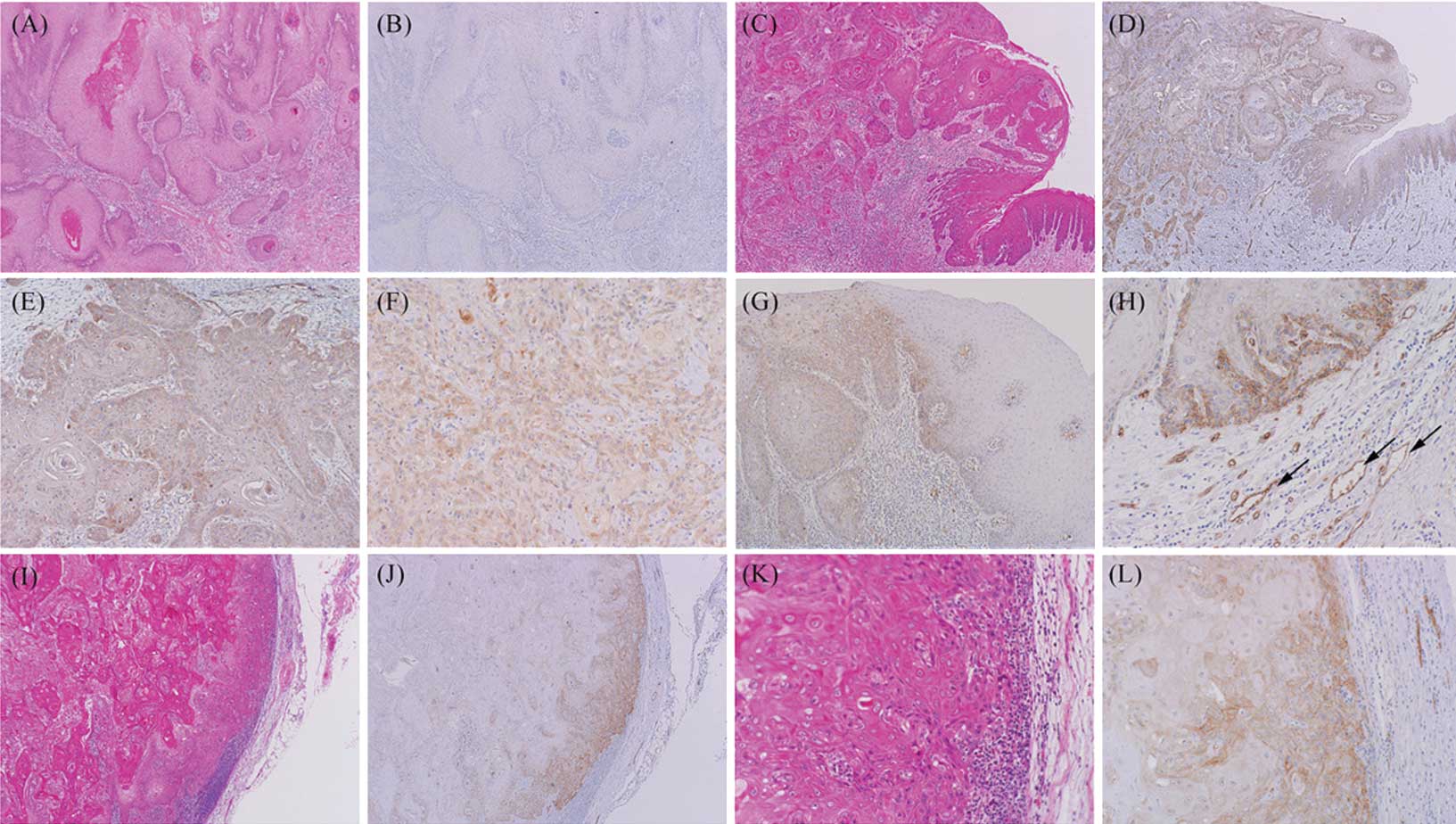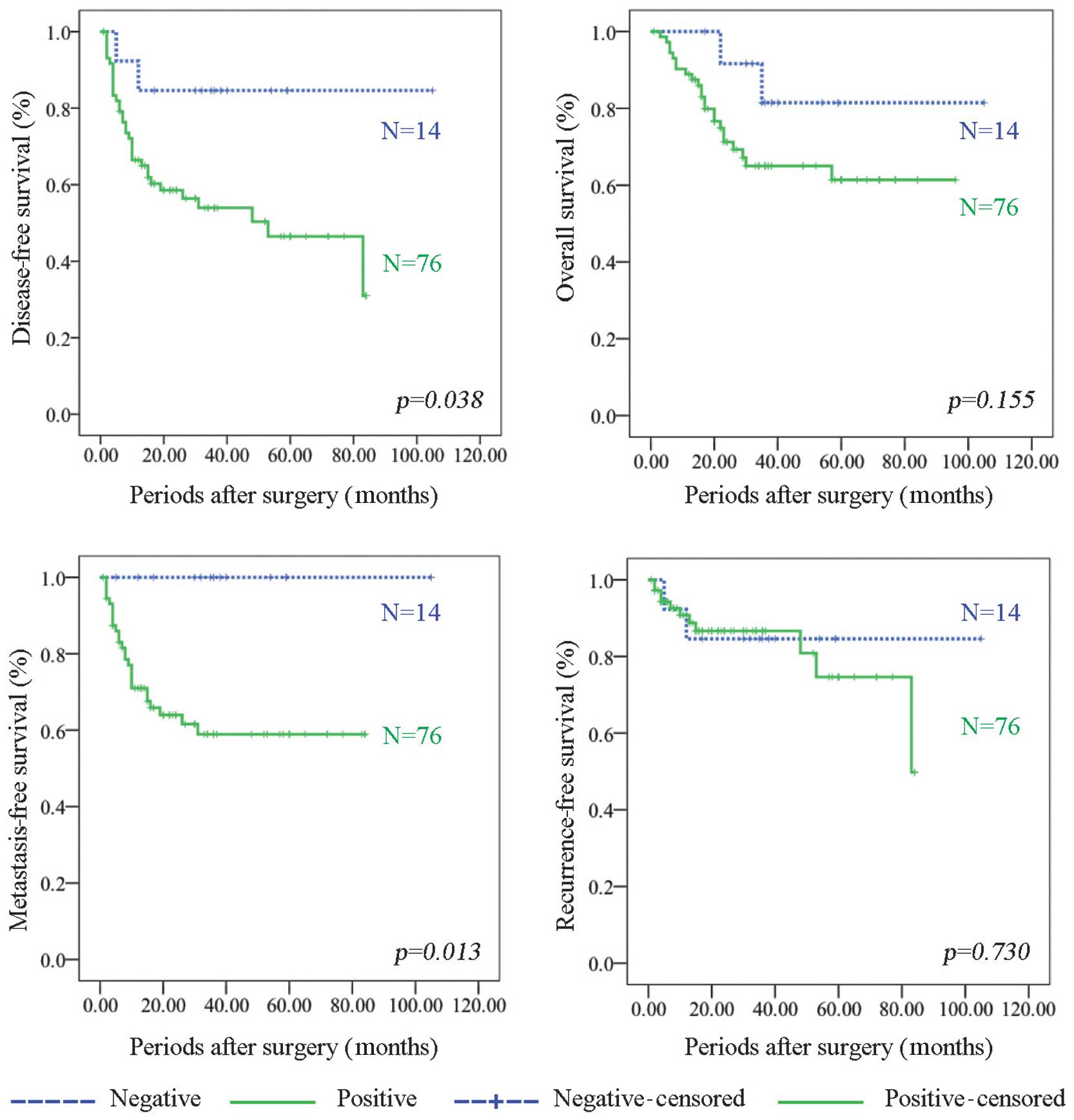|
1
|
Ha PK, Chang SS, Glazer CA, Califano JA
and Sidransky D: Molecular techniques and genetic alterations in
head and neck cancer. Oral Oncol. 45:335–339. 2009. View Article : Google Scholar : PubMed/NCBI
|
|
2
|
Gunduz M, Ouchida M, Fukushima K, Hanafusa
H, Etani T, Nishioka S, Nishizaki K and Shimizu K: Genomic
structure of the human ING1 gene and tumor-specific mutations
detected in head and neck squamous cell carcinomas. Cancer Res.
60:3143–3146. 2000.PubMed/NCBI
|
|
3
|
Gunduz M, Ouchida M, Fukushima K, Ito S,
Jitsumori Y, Nakashima T, Nagai N, Nishizaki K and Shimizu K:
Allelic loss and reduced expression of the ING3, a candidate tumor
suppressor gene at 7q31, in human head and neck cancers. Oncogene.
21:4462–4470. 2002. View Article : Google Scholar : PubMed/NCBI
|
|
4
|
Gunduz M, Nagatsuka H, Demircan K, Gunduz
E, Cengiz B, Ouchida M, Tsujigiwa H, Yamachika E, Fukushima K,
Beder L, et al: Frequent deletion and down-regulation of ING4, a
candidate tumor suppressor gene at 12p13, in head and neck squamous
cell carcinomas. Gene. 356:109–117. 2005. View Article : Google Scholar : PubMed/NCBI
|
|
5
|
Cengiz B, Gunduz E, Gunduz M, Beder LB,
Tamamura R, Bagci C, Yamanaka N, Shimizu K and Nagatsuka H: Tumor
specific mutation and downregulation of ING5 detected in oral
squamous cell carcinoma. Int J Cancer. 127:2088–2094. 2010.
View Article : Google Scholar : PubMed/NCBI
|
|
6
|
Borkosky SS, Gunduz M, Nagatsuka H, Beder
LB, Gunduz E, Ali MA, Rodriguez AP, Cilek MZ, Tominaga S, Yamanaka
N, Shimizu K and Nagai N: Frequent deletion of ING2 locus at 4q35.1
associates with advanced tumor stage in head and neck squamous cell
carcinoma. J Cancer Res Clin Oncol. 135:703–713. 2009. View Article : Google Scholar : PubMed/NCBI
|
|
7
|
Katase N, Gunduz M, Beder L, Gunduz E,
Lefeuvre M, Hatipoglu OF, Borkosky SS, Tamamura R, Tominaga S,
Yamanaka N, et al: Deletion at Dickkopf (dkk)-3 locus (11p15.2) is
related with lower lymph node metastasis and better prognosis in
head and neck squamous cell carcinomas. Oncol Res. 17:273–282.
2008. View Article : Google Scholar : PubMed/NCBI
|
|
8
|
Katase N, Gunduz M, Beder LB, Gunduz E, Al
Sheikh Ali M, Tamamura R, Yaykasli KO, Yamanaka N, Shimizu K and
Nagatsuka H: Frequent allelic loss of Dkk-1 locus (10q11.2) is
related with low distant metastasis and better prognosis in head
and neck squamous cell carcinomas. Cancer Invest. 28:103–110. 2010.
View Article : Google Scholar : PubMed/NCBI
|
|
9
|
Song J, Chang I, Chen Z, Kang M and Wang
CY: Characterization of side population in HNSCC: highly invasive,
chemoresistant and abnormal Wnt signaling. PLoS One. 5:e114562010.
View Article : Google Scholar : PubMed/NCBI
|
|
10
|
Lee EJ, Jo M, Rho SB, Park K, Yoo YN, Park
J, Chae M, Zhang W and Lee JH: Dkk3, downregulated in cervical
cancer, functions as a negative regulator of beta-catenin. Int J
Cancer. 124:287–297. 2009. View Article : Google Scholar : PubMed/NCBI
|
|
11
|
Mizobuchi Y, Matsuzaki K, Kuwayama K,
Kitazato K, Mure H, Kageji T and Nagahiro S: REIC/Dkk-3 induces
cell death in human malignant glioma. Neuro Oncol. 10:244–253.
2008. View Article : Google Scholar : PubMed/NCBI
|
|
12
|
Yang B, Du Z, Gao YT, Lou C, Zhang SG, Bai
T, Wang YJ and Song WQ: Methylation of Dickkopf-3 as a prognostic
factor in cirrhosis-related hepatocellular carcinoma. World J
Gastroenterol. 16:755–763. 2010. View Article : Google Scholar : PubMed/NCBI
|
|
13
|
Veeck J, Wild PJ, Fuchs T, Schüffler PJ,
Hartmann A, Knüchel R and Dahl E: Prognostic relevance of
Wnt-inhibitory factor-1 (WIF1) and Dickkopf-3 (DKK3) promoter
methylation in human breast cancer. BMC Cancer. 9:2172009.
View Article : Google Scholar : PubMed/NCBI
|
|
14
|
Kuphal S, Lodermeyer S, Bataille F,
Schuierer M, Hoang BH and Bosserhoff AK: Expression of Dickkopf
genes is strongly reduced in malignant melanoma. Oncogene.
25:5027–5036. 2006. View Article : Google Scholar : PubMed/NCBI
|
|
15
|
Zenzmaier C, Untergasser G, Hermann M,
Dirnhofer S, Sampson N and Berger P: Dysregulation of Dkk-3
expression in benign and malignant prostatic tissue. Prostate.
68:540–547. 2008. View Article : Google Scholar : PubMed/NCBI
|
|
16
|
Maehata T, Taniguchi H, Yamamoto H, Nosho
K, Adachi Y, Miyamoto N, Miyamoto C, Akutsu N, Yamaoka S and Itoh
F: Transcriptional silencing of Dickkopf gene family by CpG island
hypermethylation in human gastrointestinal cancer. World J
Gastroenterol. 14:2702–2714. 2008. View Article : Google Scholar : PubMed/NCBI
|
|
17
|
Zhang Y, Dong WG, Yang ZR, Lei XF and Luo
HS: Expression of Dickkopf-3 in esophageal squamous cell carcinoma.
Zhonghua Nei Ke Za Zhi. 49:325–327. 2010.PubMed/NCBI
|
|
18
|
Yamachika E, Tsujigiwa H, Shirasu N, Ueno
T, Sakata Y, Fukunaga J, Mizukawa N, Yamada M and Sugahara T:
Immobilized recombinant human bone morphogenetic protein-2 enhances
the phosphorylation of receptor-activated Smads. J Biomed Mater Res
A. 88:599–607. 2009. View Article : Google Scholar : PubMed/NCBI
|
|
19
|
Kikuchi A, Kishida S and Yamamoto H:
Regulation of Wnt signaling by protein-protein interaction and
post-translational modifications. Exp Mol Med. 38:1–10. 2006.
View Article : Google Scholar : PubMed/NCBI
|
|
20
|
Kurayoshi M, Oue N, Yamamoto H, Kishida M,
Inoue A, Asahara T, Yasui W and Kikuchi A: Expression of Wnt-5a is
correlated with aggressiveness of gastric cancer by stimulating
cell migration and invasion. Cancer Res. 66:10439–10448. 2006.
View Article : Google Scholar : PubMed/NCBI
|
|
21
|
Sato H, Suzuki H, Toyota M, Nojima M,
Maruyama R, Sasaki S, Takagi H, Sogabe Y, Sasaki Y, Idogawa M, et
al: Frequent epigenetic inactivation of DICKKOPF family genes in
human gastrointestinal tumors. Carcinogenesis. 28:2459–2466. 2007.
View Article : Google Scholar : PubMed/NCBI
|
|
22
|
Suzuki H, Toyota M, Carraway H, Gabrielson
E, Ohmura T, Fujikane T, Nishikawa N, Sogabe Y, Nojima M, Sonoda T,
et al: Frequent epigenetic inactivation of Wnt antagonist genes in
breast cancer. Br J Cancer. 98:1147–1156. 2008. View Article : Google Scholar : PubMed/NCBI
|
|
23
|
Götze S, Wolter M, Reifenberger G, Müller
O and Sievers S: Frequent promoter hypermethylation of Wnt pathway
inhibitor genes in malignant astrocytic gliomas. Int J Cancer.
126:2584–2593. 2010.PubMed/NCBI
|
|
24
|
Ding Z, Qian YB, Zhu LX and Xiong QR:
Promoter methylation and mRNA expression of Dkk-3 and WIF-1 in
hepatocellular carcinoma. World J Gastroenterol. 15:2595–2601.
2009. View Article : Google Scholar : PubMed/NCBI
|
|
25
|
Fujikane T, Nishikawa N, Toyota M, Suzuki
H, Nojima M, Maruyama R, Ashida M, Ohe-Toyota M, Kai M, Nishidate
T, et al: Genomic screening for genes upregulated by demethylation
revealed novel targets of epigenetic silencing in breast cancer.
Breast Cancer Res Treat. 122:699–710. 2010. View Article : Google Scholar : PubMed/NCBI
|
|
26
|
Veeck J, Bektas N, Hartmann A, Kristiansen
G, Heindrichs U, Knüchel R and Dahl E: Wnt signaling in human
breast cancer: expression of the putative Wnt inhibitor Dickkopf-3
(DKK3) is frequently suppressed by promoter hypermethylation in
mammary tumours. Breast Cancer Res. 10:R822008. View Article : Google Scholar : PubMed/NCBI
|
|
27
|
Licchesi JD, Westra WH, Hooker CM, Machida
EO, Baylin SB and Herman JG: Epigenetic alteration of Wnt pathway
antagonists in progressive glandular neoplasia of the lung.
Carcinogenesis. 29:895–904. 2008. View Article : Google Scholar : PubMed/NCBI
|
|
28
|
Hirata H, Hinoda Y, Nakajima K, Kikuno N,
Yamamura S, Kawakami K, Suehiro Y, Tabatabai ZL, Ishii N and Dahiya
R: Wnt antagonist gene polymorphisms and renal cancer. Cancer.
115:4488–4503. 2009. View Article : Google Scholar : PubMed/NCBI
|
|
29
|
Pei Y, Kano J, Iijima T, Morishita Y,
Inadome Y and Noguchi M: Overexpression of Dickkopf 3 in
hepatoblastomas and hepatocellular carcinomas. Virchows Arch.
454:639–646. 2009. View Article : Google Scholar : PubMed/NCBI
|
|
30
|
Zitt M, Untergasser G, Amberger A, Moser
P, Stadlmann S, Zitt M, Müller HM, Mühlmann G, Perathoner A,
Margreiter R, Gunsilius E and Ofner D: Dickkopf-3 as a new
potential marker for neoangiogenesis in colorectal cancer:
expression in cancer tissue and adjacent non-cancerous tissue. Dis
Markers. 24:101–109. 2008. View Article : Google Scholar : PubMed/NCBI
|
|
31
|
Untergasser G, Steurer M, Zimmermann M,
Hermann M, Kern J, Amberger A, Gastl G and Gunsilius E: The
Dickkopf-homolog 3 is expressed in tumor endothelial cells and
supports capillary formation. Int J Cancer. 122:1539–1547. 2008.
View Article : Google Scholar : PubMed/NCBI
|
|
32
|
Folkman J, Bach M, Rowe JW, Davidoff F,
Lambert P, Hirsch C, Goldberg A, Hiatt HH, Glass J and Henshaw E:
Tumor angiogenesis - therapeutic implications. N Engl J Med.
285:1182–1186. 1971. View Article : Google Scholar : PubMed/NCBI
|
|
33
|
Bergers G and Benjamin LE: Tumorigenesis
and the angiogenic switch. Nat Rev Cancer. 3:401–410. 2003.
View Article : Google Scholar
|
|
34
|
Carmeliet P and Jain RK: Angiogenesis in
cancer and other diseases. Nature. 407:249–257. 2000. View Article : Google Scholar : PubMed/NCBI
|

















